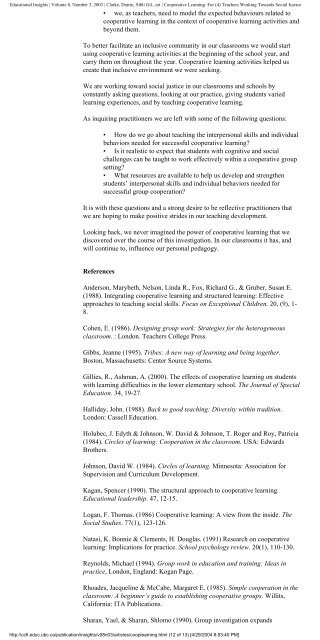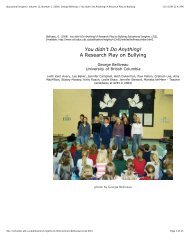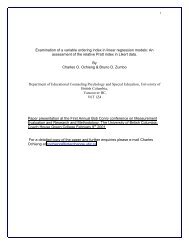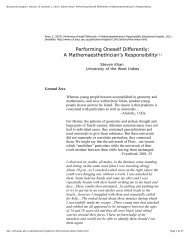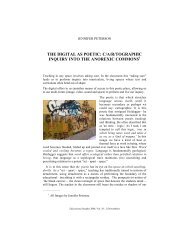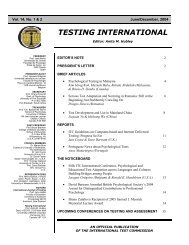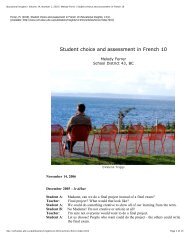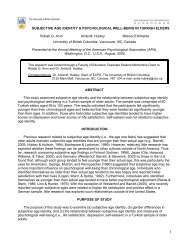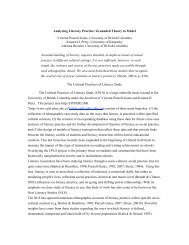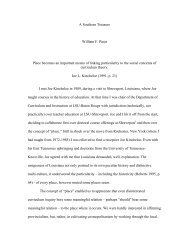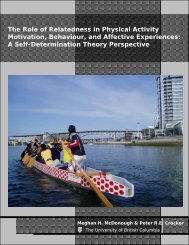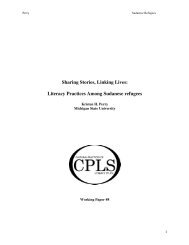Educational Insights | Volume 8, Number 3, 2003 | Clarke, Darrin ...
Educational Insights | Volume 8, Number 3, 2003 | Clarke, Darrin ...
Educational Insights | Volume 8, Number 3, 2003 | Clarke, Darrin ...
You also want an ePaper? Increase the reach of your titles
YUMPU automatically turns print PDFs into web optimized ePapers that Google loves.
<strong>Educational</strong> <strong>Insights</strong> | <strong>Volume</strong> 8, <strong>Number</strong> 3, <strong>2003</strong> | <strong>Clarke</strong>, <strong>Darrin</strong>, Sibli Gil...art | Cooperative Learning: For (4) Teachers Working Towards Social Justice<br />
• we, as teachers, need to model the expected behaviours related to<br />
cooperative learning in the context of cooperative learning activities and<br />
beyond them.<br />
To better facilitate an inclusive community in our classrooms we would start<br />
using cooperative learning activities at the beginning of the school year, and<br />
carry them on throughout the year. Cooperative learning activities helped us<br />
create that inclusive environment we were seeking.<br />
We are working toward social justice in our classrooms and schools by<br />
constantly asking questions, looking at our practice, giving students varied<br />
learning experiences, and by teaching cooperative learning.<br />
As inquiring practitioners we are left with some of the following questions:<br />
• How do we go about teaching the interpersonal skills and individual<br />
behaviors needed for successful cooperative learning?<br />
• Is it realistic to expect that students with cognitive and social<br />
challenges can be taught to work effectively within a cooperative group<br />
setting?<br />
• What resources are available to help us develop and strengthen<br />
students’ interpersonal skills and individual behaviors needed for<br />
successful group cooperation?<br />
It is with these questions and a strong desire to be reflective practitioners that<br />
we are hoping to make positive strides in our teaching development.<br />
Looking back, we never imagined the power of cooperative learning that we<br />
discovered over the course of this investigation. In our classrooms it has, and<br />
will continue to, influence our personal pedagogy.<br />
References<br />
Anderson, Marybeth, Nelson, Linda R., Fox, Richard G., & Gruber, Susan E.<br />
(1988). Integrating cooperative learning and structured learning: Effective<br />
approaches to teaching social skills. Focus on Exceptional Children. 20, (9), 1-<br />
8.<br />
Cohen, E. (1986). Designing group work: Strategies for the heterogeneous<br />
classroom. : London. Teachers College Press.<br />
Gibbs, Jeanne (1995). Tribes: A new way of learning and being together.<br />
Boston, Massachusetts: Center Source Systems.<br />
Gillies, R., Ashman, A. (2000). The effects of cooperative learning on students<br />
with learning difficulties in the lower elementary school. The Journal of Special<br />
Education. 34, 19-27.<br />
Halliday, John. (1988). Back to good teaching: Diversity within tradition.<br />
London: Cassell Education.<br />
Holubec, J. Edyth & Johnson, W. David & Johnson, T. Roger and Roy, Patricia<br />
(1984). Circles of learning: Cooperation in the classroom. USA: Edwards<br />
Brothers.<br />
Johnson, David W. (1984). Circles of learning. Minnesota: Association for<br />
Supervision and Curriculum Development.<br />
Kagan, Spencer (1990). The structural approach to cooperative learning.<br />
<strong>Educational</strong> leadership. 47, 12-15.<br />
Logan, F. Thomas. (1986) Cooperative learning: A view from the inside. The<br />
Social Studies. 77(1), 123-126.<br />
Natasi, K. Bonnie & Clements, H. Douglas. (1991) Research on cooperative<br />
learning: Implications for practice. School psychology review. 20(1), 110-130.<br />
Reynolds, Michael (1994). Group work in education and training: Ideas in<br />
practice, London, England: Kogan Page.<br />
Rhoades, Jacqueline & McCabe, Margaret E. (1985). Simple cooperation in the<br />
classroom: A beginner’s guide to establishing cooperative groups. Willits,<br />
California: ITA Publications.<br />
Sharan, Yael, & Sharan, Shlomo (1990). Group investigation expands<br />
http://ccfi.educ.ubc.ca/publication/insights/v08n03/articles/cooplearning.html (12 of 13) [4/29/2004 8:53:40 PM]


